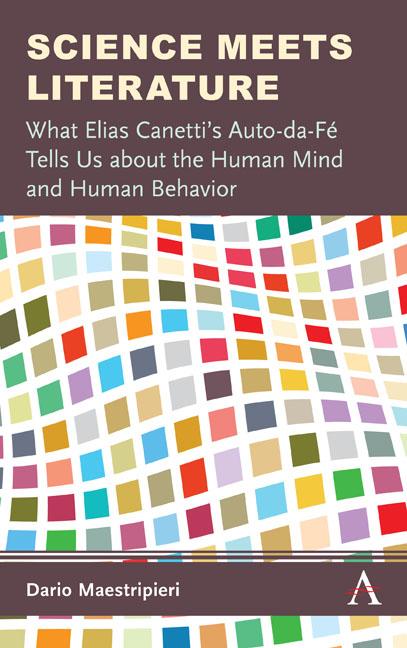 Science Meets Literature
Science Meets Literature Book contents
- Frontmatter
- Contents
- Preface
- Acknowledgments
- Chapter One Why Science and Literature?
- Chapter Two Elias Canetti: A Visionary Literary Genius on a Quest to Understand Human Nature
- Chapter Three The Plot of Auto-da-Fé
- Chapter Four Auto-da-Fé Is a Novel about Human Nature
- Chapter Five Major Themes Running Through Auto-da-Fé
- Chapter Six Analysis of Part I: A Head Without a World
- Chapter Seven Analysis of Part II: Headless World
- Chapter Eight Analysis of Part III: The World in the Head
- Chapter Nine Narrative Strategies in Auto-da-Fé
- Chapter Ten Consilience, the Canetti Way
- Elias Canetti: Chronology
- References
- Index
Chapter Eight - Analysis of Part III: The World in the Head
Published online by Cambridge University Press: 06 July 2019
- Frontmatter
- Contents
- Preface
- Acknowledgments
- Chapter One Why Science and Literature?
- Chapter Two Elias Canetti: A Visionary Literary Genius on a Quest to Understand Human Nature
- Chapter Three The Plot of Auto-da-Fé
- Chapter Four Auto-da-Fé Is a Novel about Human Nature
- Chapter Five Major Themes Running Through Auto-da-Fé
- Chapter Six Analysis of Part I: A Head Without a World
- Chapter Seven Analysis of Part II: Headless World
- Chapter Eight Analysis of Part III: The World in the Head
- Chapter Nine Narrative Strategies in Auto-da-Fé
- Chapter Ten Consilience, the Canetti Way
- Elias Canetti: Chronology
- References
- Index
Summary
As the social world— the world of people with their psychological and social propensities— enters Peter Kien's mind and life, his illusions and delusions are shattered. One of them is that the intellectual is a fundamentally different human being from other people— he has elevated himself to a condition that makes him qualitatively different from others and immune to the rules and influences that govern their lives— and that his chosen life strategy, the life of the mind, is a viable strategy for survival in the world. This illusion results in the failure to identify the commonalities in the processes in the intellectual's mind and in the minds of other people, as well as the failure to recognize that the social relationships between the intellectual and other people are not immune to the rules and influences that regulate relationships between all people.
The intellectual fails to recognize the fundamental characteristics of human nature in two fundamental domains. The first is the domain of the psychological experience: mental life in both intellectuals and nonintellectuals is similarly regulated by the same selfcentered needs, motivations, goals, and desires, and is prone to the same errors that this self- centered perspective necessarily entails: misreading the self and others in a way that is convenient to the self, illusions that people and events are more controllable than they are, confusing fantasy and reality, and so on. The second is the social domain: social relationships involving intellectuals and nonintellectuals are similarly regulated by desire for control/ power (dominance) or sexual desire. Social dynamics unfold according to consistent processes and result in predictable outcomes. Some individuals survive, others don't; some achieve their goals, others don't; some dominate, others are dominated.
Kien's belief that the intellectual is free from the constraints of human nature encompasses two kinds of deadly illusions. The first is Kien's illusion that he does not need the companionship of other people (other than some services that they provide), that he understands others’ behaviors and their motives, that he can tolerate some limited interactions with selected others when these interactions occur in relation to his books, and that he can control these interactions. He has a primitive understanding of social dynamics between people, for example, the dynamics of power that exist in all relationships between two individuals.
- Type
- Chapter
- Information
- Science Meets LiteratureWhat Elias Canetti's Auto-da-Fé Tells Us about the Human Mind and Human Behavior, pp. 149 - 162Publisher: Anthem PressPrint publication year: 2019


